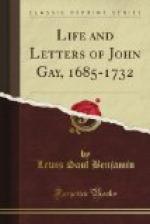Lord Clarendon stayed at Hanover even a shorter time than he had expected. On July 30th Lord Oxford was dismissed, and the white staff was given to the Duke of Shrewsbury, one of whose first acts was to recall the Tory Ambassador. Two days later Queen Anne died, and the Elector George Lewis succeeded to her throne under the style of George I. Lord Clarendon returned at once to England, and with him came Gay, saddened by the blasting of his hopes of advancement.
He was welcomed back by his friends, and received in particular an enthusiastic greeting from Pope, who wrote on September 23rd: “Welcome to your native soil! Welcome to your friend! Thrice welcome to me! whether returned in glory, blessed with Court interest, the love and familiarity of the great, and filled with agreeable hopes, or melancholy with dejection, contemplative of the changes of fortune, and doubtful for the future—whether returned a triumphant Whig or a desponding Tory, equally all hail! equally beloved and welcome to me! If happy, I am to share in your elevation; if unhappy, you have still a warm corner in my heart and a retreat at Binfield in the worst of times at your service.” In this same letter Pope, always anxious to assist Gay, added: “Pardon me if I add a word of advice in the practical way. Write something on the King, or Prince or Princess. On whatever foot you may be with the Court, this can do no harm."[12]
* * * * *
The change of Government having dashed to the ground his hopes of advancement in the diplomatic service, Gay thought that he could not do better than follow Pope’s suggestion. Like the majority of men of letters of his day, and not having the independence of spirit of Swift and Pope, he hungered after a patron—a Minister might be good, but Ministers go out of office, and a member of the reigning family would be better. Remembering the kindly welcome given him at Hanover by the royal lady who was now Princess of Wales, he had indulged in a dream that a place would be offered him in her household. “Poor Gay is much where he was, only out of the Duchess [of Monmouth]’s family and service,” Arbuthnot wrote to Swift, October 19th, 1714. “He has some confidence in the Princess and Countess of Picborough; I wish it may be significant to him. I advised him to make a poem upon the Princess before she came over, describing her to the English ladies; for it seems that the Princess does not dislike that. (She is really a person that I believe will give great content to everybody). But Gay was in such a grovelling condition as to the affairs of this world, that his Muse would not stoop to visit him."[13]
No proposal, however, being made to him, Gay, following the advice of Pope and Arbuthnot, proceeded to remind the new Court of his existence, and in November published “A Letter to a Lady, occasioned by the arrival of Her Royal Highness “—the “Lady” being, it is generally assumed, Mrs. Howard. In these verses he gave the assurance that he had desired the elements to arrange for the Princess an agreeable passage to England:—




